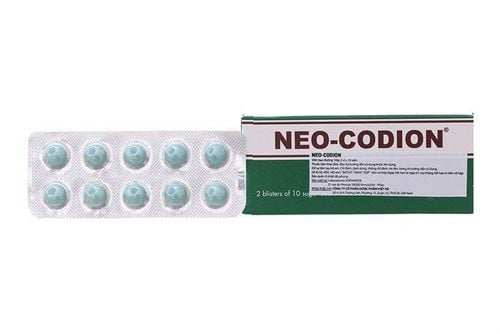This is an automatically translated article.
The article was professionally consulted by Doctor Tran Thi Diem Trang - Respiratory Internal Medicine Doctor - Department of Medical Examination & Internal Medicine - Vinmec Central Park International General Hospital. The doctor has more than 10 years of experience in the treatment of respiratory diseases.Cough is a reflex to expel foreign objects, secretions, microorganisms ... out of the respiratory tract to protect the respiratory tract. Cough is considered acute when less than 3 weeks, subacute 3-8 weeks, chronic cough when lasting more than 8 weeks.
Prolonged cough is often caused by the following causes: Rhinitis, asthma, gastroesophageal reflux disease, chronic bronchitis, bronchiectasis, tuberculosis, non-asthmatic eosinophilic lung disease, lung cancer, antiretroviral drugs pressure. Since there are many causes of a chronic cough, it is important to see a respiratory specialist to properly identify the disease and treat it appropriately. Tests that help diagnose the disease depending on the cause are usually: blood count, chest X-ray, Pulmonary function measurement, gastroscopy, chest CT...
1. Causes of nocturnal cough
Coughs (and nocturnal coughs) are of two types: dry coughs and productive coughs. Possible causes of nocturnal cough include:1.1 Respiratory tract infection The cause of a persistent cough due to infection in our country is usually tuberculosis.
Suggested symptoms: Coughing up phlegm for more than 2 weeks, possibly with coughing up fresh blood or bloody sputum, which can range from little to a lot, weight loss, poor appetite, fatigue, mild fever in the afternoon, night sweats, chest pain, severe will make it difficult to breathe.
Diagnosis by: chest X-ray and sputum test.
The disease is contagious and leaves many sequelae, so it should be detected and treated early.
1.2 Postnasal drip syndrome Postnasal drip occurs when mucus flows from the nose area to the throat. At night, this phenomenon occurs more, easier due to lying position.
Postnasal drip syndrome occurs when the body produces more mucus than usual, especially when the body has a cold, flu or allergies. When mucus flows down the back of the throat, it stimulates the cough reflex and causes nocturnal cough.
Other symptoms of postnasal drip include:
Sore throat Feeling of a lump in the throat Difficulty swallowing Runny nose

Other symptoms of gastroesophageal reflux disease include:
Heartburn Chest pain Ợ On acidic foods or liquids Feeling like a lump in your throat Chronic cough Chronic sore throat Mild hoarseness Difficulty swallowing 1.4 Non-asthmatic eosinophilic bronchitis is an increasingly recognized cause of chronic cough accounting for 20-25% of chronic cough causes. Patients often have a history of allergies.
Diagnosis is based on increased eosinophil in sputum >3%, no airway obstruction noted. Response to inhaled corticosteroid therapy
1.5 Asthma Bronchial asthma is a chronic inflammation of the airways, which increases spasm, edema, and secretion. And cough is one of the typical symptoms of bronchial asthma. Cough during an asthma attack is normally a dry cough, at the end of an asthma attack or when bronchial asthma is superinfected is a cough with sputum. Cough in bronchial asthma usually occurs at night and near dawn.
With bronchial asthma, a single cough is rarely present. Other symptoms include:
Wheezing Shortness of breath Feeling of tightness in the chest or chest pain Coughing or wheezing A wheezing sound when exhaling

1.6 Bronchiectasis accounted for about 4% of causes of persistent cough Symptoms: Chronic productive cough, possibly with hemoptysis, or shortness of breath is often the result of a chronic respiratory infection, previous tuberculosis infection. : X-ray, chest CT
1.7 Bronchous cancer Persistent cough accounts for about 2% of cases Suggested symptoms: New or changed cough in long-term smokers, cough persists for more than one month after stopping smoking, with hemoptysis Tests: chest X-ray, chest CT, bronchoscopy biopsy
1.8 Antihypertensive drugs of ACE inhibitors: Often used in patients with high blood pressure, or pathology Cardiovascular Symptoms: dry cough is a common symptom accounting for up to 15% of patients treated with this group of drugs. Appears 1 week after treatment, or sometimes 6 months after treatment Cough will stop one to four days after stopping the drug.
Trắc nghiệm: Bạn có phân biệt được chính xác cảm lạnh và cúm mùa?
Cảm cúm và cảm lạnh là hai khái niệm mà chúng ta thường đánh đồng nó giống nhau, không phân biệt rõ ràng. Dưới đây là một số câu hỏi trắc nghiệm, giúp bạn có thêm những kiến thức phân biệt cảm lạnh và cảm cúm. Từ đó, có những biện pháp điều trị bệnh phù hợp.2. How to relieve and prevent cough at night
When experiencing a prolonged cough that does not go away, the patient needs to pay attention to the following issues:Do not self-medicate: There are many diseases that lead to prolonged cough, if the cause is not properly identified but arbitrarily using drugs can cause side effects, complications that make the disease worse, or cause drug resistance, which will be very harmful to health. See a specialist: When experiencing symptoms of a persistent cough that does not go away, the patient should see a doctor as soon as possible. Determining the cause and correct treatment according to the standard regimen will help treat the disease effectively. Nasopharyngeal hygiene: Patients should rinse their mouth and clean their nose with physiological saline solution. When the bacteria are killed, the inflammation is reduced slightly, the cough is significantly reduced. Avoid contact with contaminated environment: Stay away from toxic environments, lots of dust, animal hair, ... to help limit the worsening of cough. Avoid irritating factors: Dust, pet hair, pollen, cigarette smoke,... are irritants. Try to get rid of them as much as possible, such as closing the bedroom window, keeping pets out of the bedroom, smoking, etc. Drink lots of water: Drink plenty of water and fluids now. It will work to thin the mucus in the nose and phlegm in the throat, which helps the cough subside quickly. Considerations when using over-the-counter medicines: Some over-the-counter cough suppressants and expectorants can be purchased at pharmacies, they also have certain effects, but they should not be overused.
Please dial HOTLINE for more information or register for an appointment HERE. Download MyVinmec app to make appointments faster and to manage your bookings easily.
Articles refer to sources: healthline.com and medicalnewstoday.com













